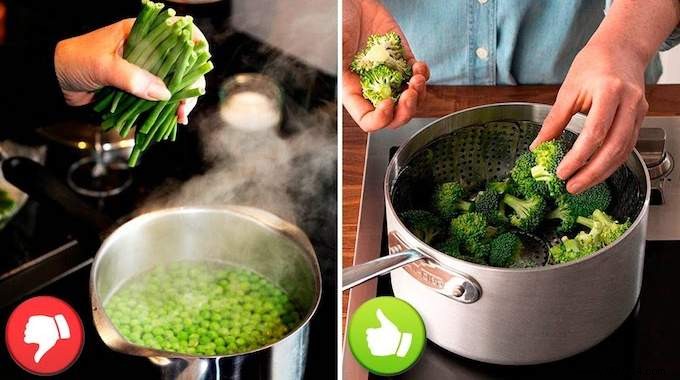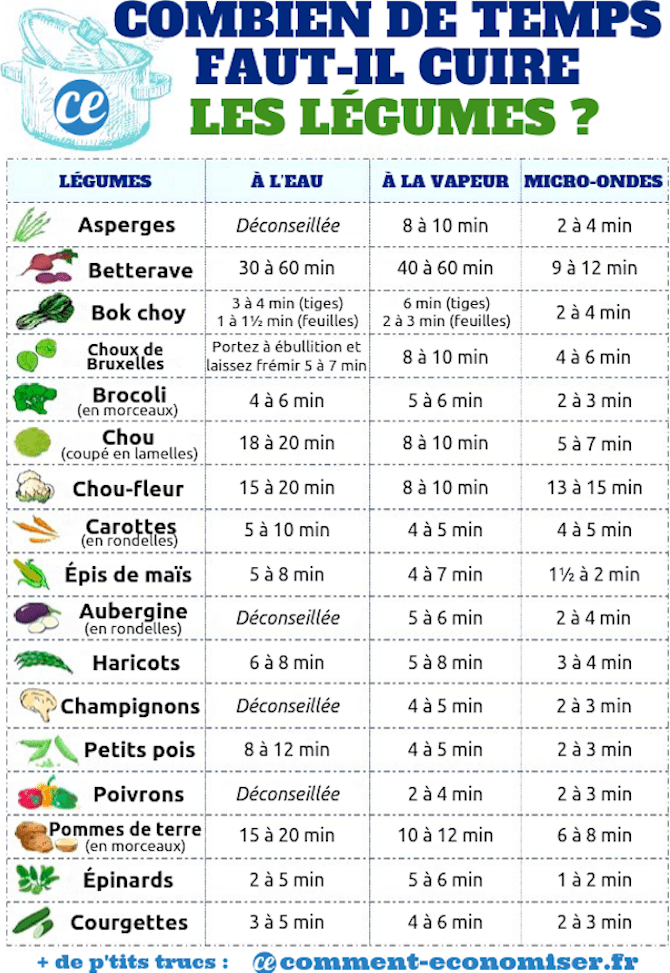
Eating vegetables is good for your health.
But you still need to know how to cook them to preserve all their vitamins and flavors!
Indeed, to make the most of the benefits of vegetables, it is important to respect the cooking time.
And this cooking time obviously varies according to the vegetables, but also according to the cooking used.
Fortunately, here is the practical guide to know how long to cook vegetables according to the type of cooking . Watch:

Click here to easily print the guide in PDF.
Cooking in water: not recommended
Steam cooking: 8 to 10 min
Microwave cooking: 2 to 4 mins
Cooking in water: 30 to 60 min
Steaming: 40 to 60 min
Microwave cooking: 9 to 12 min
Cooking in water: 3 to 4 min (for the stems) and 1 to 1½ min (for the leaves)
Steaming: 6 min (for the stems) and 2 to 3 min (for the leaves)
Microwave cooking: 2 to 4 mins
Cooking in water: bring to a boil and let simmer for 5 to 7 minutes
Steaming: 8 to 10 min
Microwave cooking: 4 to 6 mins
Cooking in water: 4 to 6 mins
Steaming: 5 to 6 min
Microwave cooking: 2 to 3 mins
Cooking in water: 18 to 20 min
Steaming: 10 to 15 min
Microwave cooking: 5 to 7 min
Cooking in water: 15 to 20 min
Steaming: 8 to 10 min
Microwave cooking: 13 to 15 min
Cooking in water: 5 to 10 min
Steaming: 4 to 5 mins
Microwave cooking: 4 to 5 mins
Cooking in water: 5 to 8 mins
Steaming: 4 to 7 mins
Microwave cooking: 1½ to 2 mins
Cooking in water: not recommended
Steaming: 5 to 6 min
Microwave cooking: 2 to 4 mins
Cooking in water: 6 to 8 min
Steaming: 5 to 8 mins
Microwave cooking: 3 to 4 mins
Cooking in water: not recommended
Steaming: 4 to 5 mins
Microwave cooking: 2 to 3 mins
Cooking in water: 8 to 12 min
Steaming: 4 to 5 mins
Microwave cooking: 2 to 3 mins
Cooking in water: not recommended
Steaming: 2 to 4 mins
Microwave cooking: 2 to 3 mins
Cooking in water: 15 to 20 min
Steaming: 10 to 12 min
Microwave cooking: 6 to 8 min
Cooking in water: 2 to 5 mins
Steaming: 5 to 6 min
Microwave cooking: 1-2 mins
Cooking in water: 3 to 5 mins
Steaming: 4 to 6 mins
Microwave cooking: 2 to 3 mins

Here are the 3 gentle cooking methods that best preserve the nutritional qualities of your vegetables.
1. Pressure cooker (pressure cooker)
The pressure cooker uses a very small amount of water which is turned into steam. The vegetables cook under pressure, which retains their natural color and nutritional benefits. It is also one of the fastest methods to cook your vegetables (only 1 or 2 min).
2. Microwave cooking
Microwave cooking is the fastest. This method is essentially similar to steam cooking. And as long as you don't use too much water, it retains most of the nutrients. For example, to cook asparagus, you only need to put 2 to 3 tablespoons of water in a bowl.
3. Steaming
Quick cooking in a steamer basket is one of the best ways to preserve the nutritional qualities of your vegetables – provided you don't use too much water and don't cook them too long. Use only half a glass of water (about 120 ml) and remember to bring the water to a boil first. For most vegetables, 5-7 min is enough for steaming.
- Vegetables contain enzymes that can either produce or destroy vitamins. As soon as a vegetable is harvested, these enzymes stop the production of vitamins – but not their loss.
- To slow the loss of vitamins, most vegetables should be stored in the refrigerator until cooked.
- Some vitamins are sensitive to oxidation . So always store cut or juicy vegetables in airtight containers in the refrigerator.
- Some vitamins are water soluble . That is to say that they are soluble in water and eliminated very quickly by our body (this is particularly the case with vitamin C and B vitamins). Typically, cooking in water contributes to the loss of these vitamins.
- Vitamin C is the most fragile and most likely to be lost during cooking, especially if you discard the cooking water when you boil your vegetables. So, always keep the vegetable cooking water and use it to make soups or broths. Click here to discover all the uses of cooking water.
- Fat-soluble vitamins , such as vitamins A and E, are less fragile. To promote their absorption by the body, favor light cooking of your vegetables.
- Frying is probably the worst of all methods to preserve the nutritional qualities of vegetables. Indeed, the heat of this cooking is so high that it destroys practically all the vitamins.
- Instead of frying vegetables, grill or roast them instead. Although these methods are less effective at preserving vitamins, they are better than frying (and roasted or grilled vegetables are so delicious).
To conclude: by using a gentle cooking method and fresh vegetables stored in the refrigerator, you can easily preserve all their nutritional benefits and qualities.